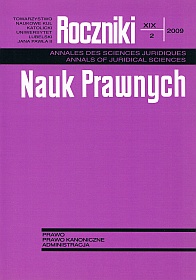Charter of Basic Rights in the Lisbon Treaty
Abstract
The article deals with the Charter of Basic Rights of the European Union, which by virtue of Article 6 of the Maastricht Treaty and later amended by the Lisbon Treaty was incorporated in the EU primary law. The Charter does not bring about an extension of competences and tasks which the Treaties assign to the Union. Neither can the member states undertake an action that would contravene the Charter. The fact that the Charter of Basic Rights of the EU has become a document with a legal force does not bring any dramatic changes in the current system. The catalogue of individual rights that hamper the activities of the EU institutions has a profound symbolic value, expressing the axiology of the EU and reinforcing respect for the basic rights of an individual in the process of integration.
Copyright (c) 2009 Roczniki Nauk Prawnych

This work is licensed under a Creative Commons Attribution-NonCommercial-NoDerivatives 4.0 International License.


